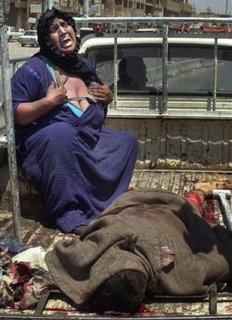Monday, October 23, 2006
Civilian Deaths in Iraq
 The death toll in Iraq is reaching daily horrendous figures. American troops have suffered some 3000 deaths with the average daily body count rising from 30-40 in 2003 to 50-60 in 2006. British troop fatalities have recently exceeded 120 but both these figures are dwarfed by the death toll among Iraqi civilians. There is, perhaps natural a tendency for us non-combatants to care less for Iraqi deaths than for those of our troops whilst also, quite rightly, feeling guilty at our own double standards; after all, we all know that a mother who loses a son greives and suffers just as much whether she be Iraqi or British. US-UK forces originally invaded Iraq to do good: to find and eliminate WMD we were told; or to expell the evil Saddam Hussein whose bloody reign had caused mass Iraqi deaths. We all know WMD haven't yet turned up but has the invasion really lifted the Ba-athist yoke of suffering from Iraqis? It seems unlikely.
The death toll in Iraq is reaching daily horrendous figures. American troops have suffered some 3000 deaths with the average daily body count rising from 30-40 in 2003 to 50-60 in 2006. British troop fatalities have recently exceeded 120 but both these figures are dwarfed by the death toll among Iraqi civilians. There is, perhaps natural a tendency for us non-combatants to care less for Iraqi deaths than for those of our troops whilst also, quite rightly, feeling guilty at our own double standards; after all, we all know that a mother who loses a son greives and suffers just as much whether she be Iraqi or British. US-UK forces originally invaded Iraq to do good: to find and eliminate WMD we were told; or to expell the evil Saddam Hussein whose bloody reign had caused mass Iraqi deaths. We all know WMD haven't yet turned up but has the invasion really lifted the Ba-athist yoke of suffering from Iraqis? It seems unlikely.Most people living in Baghdad face shortages of food, electricity and the kind of services we take for granted. On top of that they face threats to life and limb from a hydra headed insurgency entailing: sunni militias v shia militias, nationalists v western occupiers, shia groups v rival shia groups and jihadis v nonjihadis. No doubt there are also various shades of criminal groups seeking to exploit the chaos as well. Even hairdressers have been threatened with death as shaving off beards-as hairdressers occasionally do- is held by extremists to be a violation of the spirit of Islam. Recently a group of researchers from Johns Hopkins University in a Lancet article calculated some 655,000 extra civilian deaths had been caused by the war had occurred. This contrasts with official US government figures of 30-60,000 deaths. The figure has been much criticised, not least by commenters on an earlier post(8th October) of mine. But maybe, despite justified doubts, the topic deserves a little more attention.
Gavyn Davies, former adviser to Number 10 and senior economic guru to Goldman Sachs as well as Chairman of the BBC applied some analysis to the question in his occasional Guardian column recently. He notes that the researchers' figure for deaths during Saddam's time was 5.5 deaths per 1000 people while since the war the Lancet article places it at 13.3 per 1000. Wildly wide of the mark? Rubbish methodology? Davies agrees it can be criticised but mainly, it would seem, because the pre invasion figures might easily have been higher i.e. people interviewed might easily have 'forgotten about deaths which happened a few years previously'. Seems to me, though, deaths are not the sort of thing one tends to forget all that easily. Even if exaggerated to some degree, the study suggests the situation in Iraq is much, much worse than we have thought up to now. Even more reason for Bush and Blair to seek a new direction; of course it would have been better if they had not made the mistake in the first place.
Comments:
<< Home
1914-1918, four years of high-intensity warfare - British dead, 652,000; 1939-1945, six years of high-intensity warfare- British military and civilian dead, 460,000; 2003-06, three years of low-intensity warfare - Iraqi dead,
655,000? I hate to be forced to agree with George Bush...
655,000? I hate to be forced to agree with George Bush...
Your scepticism is well placed 'anonymous'.
I've recently had something of a rethink on the war Skipper (as you know) and so I'm not doing a knee-jerk defence here but the Lancet's approach is deeply flawed - the figures our anonymous friend points out above illustrate just one of the reasons why 600,000 + dead just doesn't seem credible..
I've recently had something of a rethink on the war Skipper (as you know) and so I'm not doing a knee-jerk defence here but the Lancet's approach is deeply flawed - the figures our anonymous friend points out above illustrate just one of the reasons why 600,000 + dead just doesn't seem credible..
I'm aware of the shortcomings of the calculations but when a highly numerate and shrewd person like Davies applies his mind to a problem like this, I think we should give it a good hearing. My conclusion, I'd maintain, still holds notwithstanding.
One key difference - British civilians were not living in the middle of a battlefield. The blitz is hardly comparable in this sense to constant street fighting, as in Iraq.
You could also ague that civilians are much more vulnerable than trained fighting men, especially when they are being rounded up at night by militias, abducted and then murdered by the score. I see the UN's estimate of the death toll is 3000 a month, which would make the official estimate seem well short.
Post a Comment
<< Home





